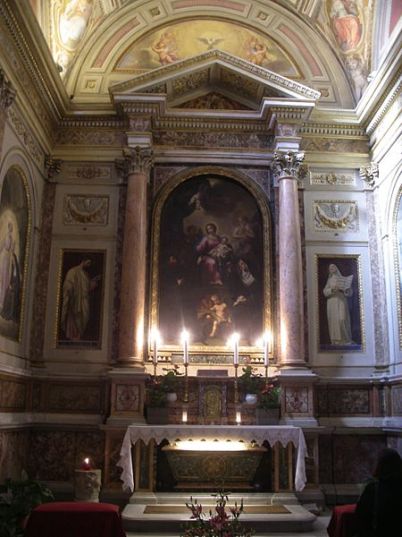A great many mothers number among the communion of saints, (the opportunities of sanctification are so plentiful, you see), but one who springs to mind for her patience and perseverance is St Monica, the mother of St Augustine.
Just as he is infamous for giving his mother a hard time, so she is famous for sticking by him (even when he tried to give her the slip and sailed for Rome without her) and waiting in prayerful hope for his conversion. When Monica was aware that her end was nigh, she said to Augustine*, “Lay this body anywhere, let not the care for it trouble you at all. This only I ask, that you will remember me at the Lord’s altar, wherever you be”.
This last request to her son really struck me when I first read Augustine’s confessions. He himself does not dwell on it, rather on ‘how she had ever burned with anxiety respecting her burial-place, which she had provided and prepared for herself by the body of her husband’, and his thankfulness that this had ceased to vex her in the end.
Perhaps he doesn’t comment on it because it was – by then – the most natural thing in the world to honour his mother by remembering her ‘at the Lord’s altar’. It seems the least we can do, doesn’t it, to remember always in prayer the one who gave birth to us and who has sacrificed more than we will ever know for us?
This Mothering Sunday, among the cards and the flowers (here’s hoping) and the breakfast in bed (dreaming now), there’s an opportunity to consider how we are keeping the fourth commandment not only with respect to our mothers, but – as we hear the Gospel of the prodigal son – our fathers too.
The importance of ‘honour thy father and mother’ is reflected in its position within the Decalogue. It comes immediately after the three commandments which deal with our relationship with God, and before ‘thou shalt not kill’. In childhood, it meant obedience and respect, but what does it mean for us now? Relationships are essentially dynamic things; they never stay still.
We are always growing closer to or further from people, and our relationship with our parents is no different. We may not see them as often as we would like but no matter how far apart we are, no matter how busy our lives are, we can always, at the very least, remember them in our prayers.
_________________________
*Confessions, book IX chapter 11
Image: Altar and tomb of St Monica of Hippo
 Luke’s account of the Annunciation ends abruptly with the sentence ‘and the angel left her’. What then? Presumably, Mary sat down and took a little time to consider all that Gabriel had told her. How did she feel? She was suddenly facing a very different future from whatever she’d previously imagined. And that new future? She couldn’t have imagined even roughly how her life would unfold now.
Luke’s account of the Annunciation ends abruptly with the sentence ‘and the angel left her’. What then? Presumably, Mary sat down and took a little time to consider all that Gabriel had told her. How did she feel? She was suddenly facing a very different future from whatever she’d previously imagined. And that new future? She couldn’t have imagined even roughly how her life would unfold now. Now there’s a question! It might not seem exactly Lenten in character to spend time considering our virtues – but read on then reconsider… Years ago, the priest who most often heard my confessions used a little book that contained short passages of scripture, which he’d look up and quote from as necessary.
Now there’s a question! It might not seem exactly Lenten in character to spend time considering our virtues – but read on then reconsider… Years ago, the priest who most often heard my confessions used a little book that contained short passages of scripture, which he’d look up and quote from as necessary.